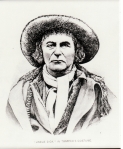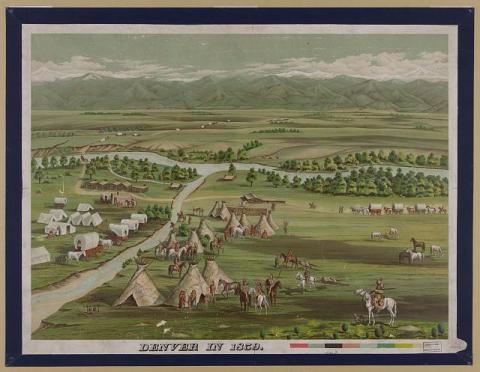Taos Lightning Makes Denver’s First Christmas a Little too Jolly
December 16, 2011 § 3 Comments
Like any extended family gathering during the holidays, Denver’s first Christmas was no less contentious. In the autumn of 1858, gold seekers and speculators from every corner of the Union converged at Cherry Creek and the South Platte River. The pioneers included a hodgepodge of miners, merchants, southerners, abolitionists, mountain men, businessmen, Christians, Mormons, and Arapahoe Indians. Early gold seekers like William Green Russell established Auraria on the west bank of Cherry Creek, while businessmen like General William Larimer settled Denver on the east bank. Before long, all 100 of them were bitterly arguing over which side of the creek would host the main town center. The pioneers didn’t stop their petty bickering until Christmas morning, when a particularly vile concoction of whiskey called “Taos Lightning” made its first appearance in the territory. On that unusually balmy day, with clear skies and a stunning backdrop of snow-peaked mountains, a frontiersman named Richens Wootton rolled his wagons into Auraria. In hopes of making fast friends, Wootton turned over a whiskey barrel and set out tin cups for all to enjoy its spirited contents. As one pioneer said of the blow-out, the wheat-distilled whiskey was “warranted to kill at forty yards,” and needless to say, “the whole camp got hilarious.”
In the weeks leading into Christmas, a majority of the Colorado pioneers decided to settle on the lower, west side of Cherry Creek. Green Russell and several mountain men built cabins along the South Platte River (near present-day Elitch Gardens). Russell named the settlement “Auraria,” for his hometown in Georgia. Not long after, General Larimer and his party of Kansas businessmen staked ground on the east bank (near Larimer Square). They dubbed it Denver City in honor of the governor of Kansas Territory, James Denver. (However, Larimer wasn’t the first to arrive on the east bank. When the owner of a half-finished cabin attempted to defend his claim, the Kansas men dangled a noose in front of his nose, thereby settling the dispute.)
As more folks staggered into the settlements, town founders of Auraria and Denver tried to coax newcomers to set up shops and build cabins on their platted streets. Even the men who wanted to stay out of the squabble were forced to take sides. Before they even unpacked their wagons, they were told to declare themselves for Auraria or Denver. The rivalry only intensified. By Christmas, Auraria claimed the early lead with twice as many shacks (50 in all), but the Denver men slowly and successfully lured many citizens away.
In an attempt to bring the pioneers together, a Methodist minister agreed to preach to the settlers. But the religious services were only a small success. According to General Larimer’s teenage son, William H. H. Larimer, they gathered for a prayer in Green Russell’s double cabin, where 10 men and two Indian women sat on buffalo robes. On the other side of the wall, William could hear money jingle as men played cards and gambled throughout their service. Larimer said, “it cannot be claimed that a majority of the pioneers were eager to attend services regularly … some were in favor, and some were lukewarm, and some were opposed entirely to the program. This opposition grew when that arch opponent of religion, whiskey, was introduced.”
The whiskey came on Christmas morning. Richens Wootton had traveled up the Front Range to trade with the Cheyenne and Arapahoe Indians; but instead of finding Indian camps, he discovered a growing settlement of thirsty pioneers. When Wootton tried passing through Auraria with his wagons, the settlers begged him to stay. In a generous Christmas spirit, Wootton rolled out several barrels of whiskey, set out tin cups, and invited all the townsfolk to imbibe freely. As William Larimer wrote, “several did help themselves, and so often that they needed help to reach their cabins, and from that time until the present day, the stock has never been exhausted.”
On the other side of the creek, the Denver men heard the raucous laughter and hooting. Hastily, the Denver men abandoned their Christmas dinners and tramped through the creek to join the Auraria revelry. All were grateful to Wootton for the diversion. As Denver historian Jerome Smiley wrote, “Before nightfall Richens Wooton (sic) was “Uncle Dick” to every man in both towns. The flowing contents of that barrel submerged for the day the last vestige of rivalry and animosity between the “cities” separated by Cherry creek.”
In a later biography, Wootton didn’t want to admit what the barrels contained. He said, “I had several barrels with me which I rolled alongside of each other and used as a counter. What was in the barrels doesn’t matter, but it was something that every well-regulated store kept on hand in those days. I think there are a few highly respected old gentlemen still living in Denver who will remember what it was and would be willing to testify that it was a good article, if it did come high.”



Fascinating!
Amazing how quick they were to leave “civilization” behind!
[…] Lightning" with him, handed out tin cups, and proceeded to get the whole camp drunk. Jolie Gallagher quoted one observer as recalling, "the whole camp got hilarious." Later during the Civil […]